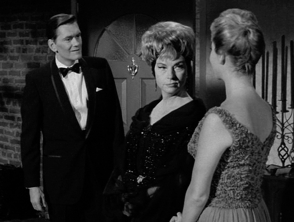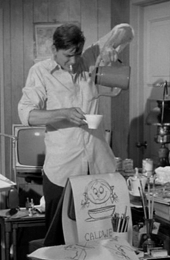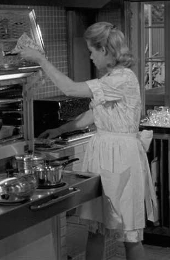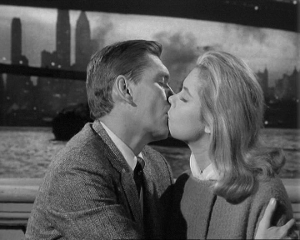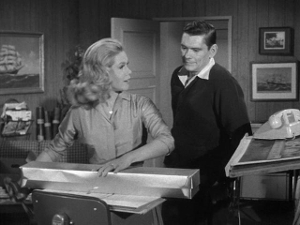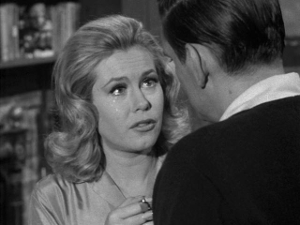The Two-Moms Proof
The Wisdom of the Trans Tweeter
Sunday, March 3, 2019 7:42 pm
I don't normally blog about social or political issues; not directly, in any event. This is meant to be a blog about art and philosophy, science fiction and writing. But today I'm really annoyed.
My Grandchild Is a Cat?
 Today I saw this sticker on a bumper. It is evil. I mean that. The person who displayed this — who apparently should be a grandparent to a human being — instead can claim only a cat. While it is possible that she is expressing some bitterness — "I gave my child life and all I got was a lousy cat!" — I imagine, rather, that she is cheerily joining in the maudlin elevation of a cat.
Today I saw this sticker on a bumper. It is evil. I mean that. The person who displayed this — who apparently should be a grandparent to a human being — instead can claim only a cat. While it is possible that she is expressing some bitterness — "I gave my child life and all I got was a lousy cat!" — I imagine, rather, that she is cheerily joining in the maudlin elevation of a cat.
It is pleasing to Satan when you call your pet your child. It is pleasing to Satan when you treat your pet like a child. It is pleasing to Satan when you settle for a pet instead of a child. Satan hates children. Satan hates people. He revels in the barrenness of modern women. He delights in the non-existence of new people, of new souls made in the image of God, of new creatures oriented to the knowledge of God.
Equating a cat to a child is sentimental nihilism. It is a retreat from family and from human life. If all you have is a cat, then all you have is a cat. Don't imagine that you are the equivalent of a mother. You own a pet. You own an animal. You are caught in narcissistic affection. If, in unconscious recognition of your wasted fertility, you dare to call your pet a child, you serve only those who hate the perpetuation of man.
A Pet Has None of the Value of a Child
Sunday, November 26, 2017 1:46 pm

It is pleasing to Satan when you call your pet your child. It is pleasing to Satan when you treat your pet like a child. It is pleasing to Satan when you settle for a pet instead of a child. Satan hates children. Satan hates people. He revels in the barrenness of modern women. He delights in the non-existence of new people, of new souls made in the image of God, of new creatures oriented to the knowledge of God.
Equating a cat to a child is sentimental nihilism. It is a retreat from family and from human life. If all you have is a cat, then all you have is a cat. Don't imagine that you are the equivalent of a mother. You own a pet. You own an animal. You are caught in narcissistic affection. If, in unconscious recognition of your wasted fertility, you dare to call your pet a child, you serve only those who hate the perpetuation of man.
The Rot Is Deep
It's All So Casual Now
Sunday, September 17, 2017 9:03 pm
So, on Netflix, I'm watching The Blacklist, that show starring James Spader. Generally it's just cool and outrageous. Like most modern TV, though, it can't merely deliver its clever plot but must also deliver an Approved Point of View.
It is particularly annoying when Reddington, an amoral killer, goes on some dogmatic rant about, oh, religious intolerance of sodomy. The writers, in their own real lives, hate (or at least must seem to hate) such intolerance, and so they can't help but depict their "hero" as doing the same — even if it makes him, at least briefly, a mouthpiece instead of a person.
Sadly, though, I experienced a more dispiriting moment in the show. Dogmatic rants at least indicate the writers are aware that they are taking positions. What happens when the rot is utterly unconscious?
It is particularly annoying when Reddington, an amoral killer, goes on some dogmatic rant about, oh, religious intolerance of sodomy. The writers, in their own real lives, hate (or at least must seem to hate) such intolerance, and so they can't help but depict their "hero" as doing the same — even if it makes him, at least briefly, a mouthpiece instead of a person.
Sadly, though, I experienced a more dispiriting moment in the show. Dogmatic rants at least indicate the writers are aware that they are taking positions. What happens when the rot is utterly unconscious?
In Vocation
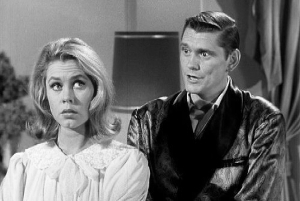 What does everyone know about Bewitched? It's about a free-spirited young witch whose uptight husband does everything he can to suppress her natural inclinations to magic.
What does everyone know about Bewitched? It's about a free-spirited young witch whose uptight husband does everything he can to suppress her natural inclinations to magic.
No. It's not.
Go back to the first season, before the show became focused on the farce, and you'll clearly see its theme. Abandon the feminist distortions and you'll see that Bewitched is about two newlyweds, thoroughly in love, who are trying to establish a normal, suburban life.
Witch and Wife
Monday, March 30, 2009 10:56 pm

No. It's not.
Go back to the first season, before the show became focused on the farce, and you'll clearly see its theme. Abandon the feminist distortions and you'll see that Bewitched is about two newlyweds, thoroughly in love, who are trying to establish a normal, suburban life.
Marriage Isn't a Lark, After All
The Carter Family Gets Incendiary!
Monday, May 30, 2005 6:49 pm
When I was a teenager and I started to read Great Literature, I read Dostoevsky's Crime and Punishment. You know what struck me then more than anything else? That a book written in the 1860s should be about an axe murderer. My miseducation to that point had not prepared me for the idea that past ages might just know a thing or two about horrible, sad, or sordid things — and, more to the point, that past ages might be unafraid to talk about them.
Mankind has been doing the same blasted thing for thousands of years. Yet it is an annoying conceit of this era that, until now, man has been naive about his own circumstances. Because civilization once aspired to better circumstances and once celebrated ideals, it is supposed that civilization was once ignorant of all our shortcomings and squalor. In fact, our civilization has simply despaired of ideals.
Mankind has been doing the same blasted thing for thousands of years. Yet it is an annoying conceit of this era that, until now, man has been naive about his own circumstances. Because civilization once aspired to better circumstances and once celebrated ideals, it is supposed that civilization was once ignorant of all our shortcomings and squalor. In fact, our civilization has simply despaired of ideals.
"Unholy and Evil"
When the Culture Could Be Honest
Monday, May 16, 2005 2:16 am
Beware! Spoilers follow.
I was watching The Godfather: Part II the other day. I had not seen it in many years. I knew how the story would go; I was prepared for the powerful scenes. I had not, however, remembered the dialogue as such — and I was struck by what Kay says
I was watching The Godfather: Part II the other day. I had not seen it in many years. I knew how the story would go; I was prepared for the powerful scenes. I had not, however, remembered the dialogue as such — and I was struck by what Kay says
Marriage, Once Upon a Time
A Screwball Comedy Hints at Better Days
Saturday, July 10, 2004 2:51 am
In very old movies a married couple is usually seen to sleep separately, husband in one twin bed and wife in the other. Nowadays we snicker at this — and rightly so. Though the motive to this contrivance may have been modesty, the effect of it is prudery. The marriage bed, after all, is the proper place for sex. By showing one bed we would affirm what is right; by showing twin beds, on the other hand, we clumsily imply that sex has no fit role in a good clean world.
Sometimes, however, an old movie can be not prudish but simply naive, and naive in a way that does affirm what is right. Case in point: My Favorite Wife. This movie, having been made in 1940, does have that silly nonsense with the twin beds; but it also has a particularly wonderful moment of sense.
Sometimes, however, an old movie can be not prudish but simply naive, and naive in a way that does affirm what is right. Case in point: My Favorite Wife. This movie, having been made in 1940, does have that silly nonsense with the twin beds; but it also has a particularly wonderful moment of sense.
© 2004-26 David Skinner · All rights reserved
